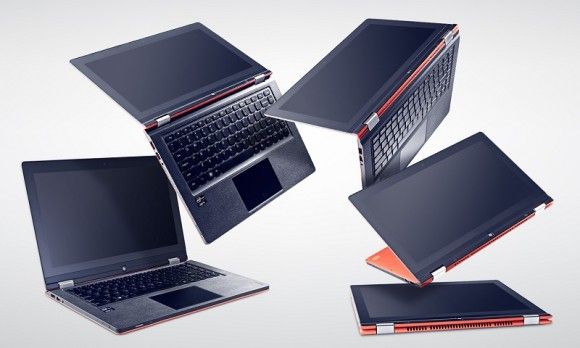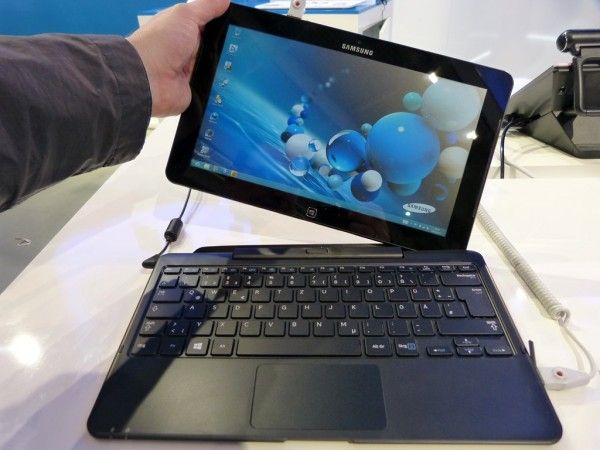The first wave of Ultrabooks brought sleek, sexy laptops to the masses. The second wave increased performance and power savings. And now, in the latter half of the second wave, and approaching the third wave, things are getting really interesting. Intel’s Ultrabook project has stimulated the creation of the most exciting laptops in recent memory. They’re calling them Ultrabook Convertibles — and I can’t wait to get one.
Before you light your torches and sharpen your pitchforks, hear me out. I know that Intel didn’t invent the convertible. We’ve seen swiveling and sliding screens for many years preceding the Ultrabook. We’ve even seen dockable screens in the Android world. What Intel is enabling though are convertibles without compromise.
My last computer was actually a convertible, but it wasn’t an Ultrabook. It was an HP Tablet PC with a swiveling screen and an active digitizer. It was also at least an inch thick and ran incredibly hot when it was doing heavy processing (to the point of throttling itself and running at half performance). To get the tablet+PC experience I had to compromise on weight, heat, battery life, and performance.
Thanks to Intel’s continuous quest for lower power consumption and higher performance, the current crop of Ivy Bridge convertibles are just passing the threshold into a compromise-free experience where you get a thin, powerful, light convertible that’s a joy to use. Right now it seems this is most effectively achieved in 11 – 13 inch devices, and when Haswell comes around, that sizes will likely down even further, offering a genuine tablet+PC experience in one device.
The latest convertible designs in the Ultrabook space are the most exciting PCs to hit the market in years. There are swiveling, sliding, folding and docking Ultrabooks — like the Lenovo Twist, Sony Vaio Duo 11, Lenovo Yoga 13, and Samsung Ativ Pro, respectively.
At GDC 2013 this year I finally got my hands on some of these new devices and I was genuinely excited about the array of unique options. Build quality was impressive across the board. And while I expected to see bloated devices, many of them were just as thin as you might expect from a non-convertible Ultrabook. For the first time since the UMPC era, it feels like there’s innovation happening in this space beyond the slow march of the clamshell laptop.
If Intel and partners play their cards right, that innovation will excite and delight customers who have been swooned by the smartphone and non-PC tablet category in recent years.
When I first switched to an Ultrabook, I was sad to give up my tablet PC functionality. Now I don’t have to. After getting to play with a number of new Ultrabook convertibles, I’ve decided that one of them is destined to be my next PC, but not just for the touchscreen/digitizer.
I use my current Ultrabook on the go every day. When I’m home I hook it up like a desktop which enables high levels of productivity.
I don’t own an iPad or other tablet, but I do occasionally wish I had one — whether I want to use the device standing or on the couch. With a convertible Ultrabook I won’t have to shell out for another device to enable that kind of functionality. When I head back home I’ll be able to hook my Ultrabook up to my desk setup and use it like a desktop. Having that level of ‘HDR computing’, as Chippy calls it, is something that is extremely useful to me for productivity and let’s me do the vast majority of my computing on one device. I can’t wait!













Same here. I have XPS 12 for work and really like to use it as a tablet occasionally. Also benefit is that you can put screen backwards in an angle and turn it around as a stand. Something a pure tablet can’t do.
Downsides is It can’t match (Surface) tablet in size and weight. But maybe next generation can.
Ideally that will improve with next generation by end of this year.
my next ultrabook will be an ultrabook. Never been a tablet fan, just seems like a big gimmick to me.
Ya, I still don’t see it worth paying > $100 extra for a touch screen ultrabook. Especially for clamshell devices and for screens > 7″. If it was a very cheap upgrade option then I’d get it for the very few times when touch is actually more effective than a keyboard or mouse.
Touch IS pretty effective, but remember its not there for replacing, rather complementing them. Besides, its a far better option than Trackpad.
You don’t always have the luxury of having a mouse.
@DavidC1
For notebooks, I use the trackpoint which I subjectively find more useful than the touchpad and touch screen. For notebooks with 10″ or larger screens, I find that touch is only better for very few scenarios like lazy browsing on the couch. With everything else, I find that sitting up with your hands on the keyboard and trackpoint to be more efficient.
Like I said it’s nice for the few times it’s better but I wouldn’t pay that much extra for it.
I have a 10″ Clover Trail tablet and more often than not, I wish it had a crappy thumb mouse in the bezel. Yup, I would find it more useful than touch in many situations. A bezel mouse is worse than a touchpad too. Maybe I’m getting too old or a mouse pointer is just more accurate.
I’m not so sure of own requirements. Touch is a ‘yes’ for me as it brings some nice additional usage scenarios, even in laptop mode.
As for convertible i’m not so sure. I haven’t found a convertible that really satisfies my need for a high-quality desktop experience although the Yoga 13 gets close. The problem there is that it’s a terrible tablet. The Lenovo Helix seems like a nice middle-ground but I wouldn’t take it with Ivy Bridge when Haswell is round the corner.
I’m sitting here using a Dell Latitude 6430U and telling myself that I should buy this and continue to supplement it with a 7″ Android tablet. I’ve never been a fan of 10″ or bigger tablets.
Chippy
Convertibles why not, but they are in need of improvement.
Sony or msi sliding like notebooks are a big fail, you just need to work with it for an afternoon to see that the keyboard touching the screen and the lack of touchpad are seriously hindering productivity and ergonomy.
I am also highly skeptical of docking convertibles as there are problems with lack of screen angle freedom, docking station not always recognized, wobbling screen. I would welcome feedback of monthes long heavy users.
The best compromise is probably the Dell XPS 12, let’s hope that Dell will soon out a v2 with decent port count and card readers as well as a working trackpad and Intl’s next generation processor.
Most of all though is that Ultrabook makers need to wakeup and start building good ultrabooks that have decent (ips) screens with decent resolutions, decent keyboards for people that spend 8 hours+ a day typing, touchpads that work, non overheating + throttling + super Noisy notebooks with 50-100Wh batteries.
Seems Toshiba got the message and for my money, if the Kyra is as promising as it looks, I may buy it over convertibles.
Guy, I understand you, but I’ve read quite a few professional reviewers and user reviews stating how surprised they were at with touch on a regular laptop.
There are those that don’t, but it seems more of them are positive towards it. As more of the younger generation grows with touchscreen devices, less and less people will get averse to it.
Of course, I’m still in my 20s, but even when showing it to my parents, they prefer touch over a touchpad and keyboard.
I have been waiting and waiting for convertibles. I got hooked on tablets with a Fujitsu ebay device eons ago, when viewing angles were atrocious (screen quality is the top priority for me now – over top of processor choice). Tried a slate, but decided that a keyboard was still required, along with screen protection – something Fujitsu’s swivel design provided with excellence along with a built in “stand” in various orientations. But it didn’t have the power to run my main programs, had a screen that got too small for my aging eyes, and the 3.8lb was a bummer. So Intels northcape or the asus transformer book have me anxiously anticipating. They should have the power the tabletpc never had, the ability to shed half the weight when desired, the built-in keyboard (and stand) on a good screen. What I don’t know is if there will be a model 1)I can afford 2)included graphics oomph like the transformer book promised or 3)if they’ll have active digitizers. I can live without #3 as I’ve since purchased an intuos tablet, but #2 remains to be seen and of course, none of it is happening without #1.
Hi Ben,
The Lenovo Yoga 13 is a nice laptop, but very unfortunately crippled by very bad wifi issues.
Lots of desperate people on the very long forum thread: http://forums.lenovo.com/t5/IdeaPad-IdeaTab-Slate-Tablets/yoga-13-wifi-issues/td-p/914595.
Any chance you could post an article similar to http://ultrabooknews.com/2012/08/08/lenovo-ideapad-u310u410-wifi-issues/.
Thanks!
It’s interesting. I’ve had two Yoga 13s with no wifi issues.
Well, either you’re lucky to have Yoga’s without bad wifi hardware, or you just don’t use them in a way that exhibits the issue.
It remains that the forum thread keeps growing and people are very upset with Lenovo appearing not to do anything about the issue.